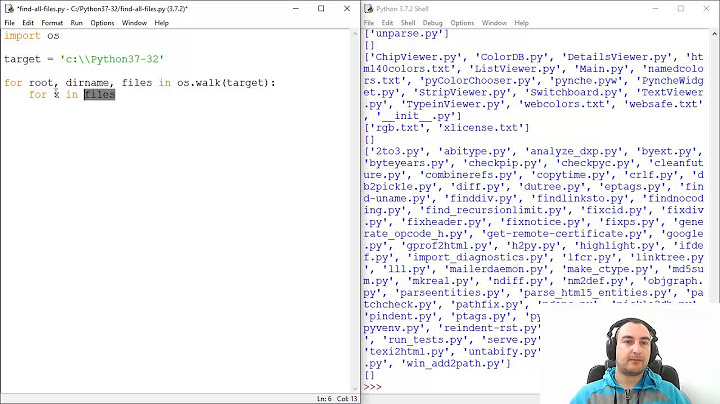How to get the summarized sizes of directories and their subdirectories?
Solution 1
This does what you're looking for:
du -sh /*
What this means:
-
-sto give only the total for each command line argument. -
-hfor human-readable suffixes likeMfor megabytes andGfor gigabytes (optional). -
/*simply expands to all directories (and files) in/.Note: dotfiles are not included; run
shopt -s dotglobto include those too.
Also useful is sorting by size:
du -sh /* | sort -h
Here:
-
-hensures thatsortinterprets the human-readable suffixes correctly.
Solution 2
I often need to find the biggest directories, so to get a sorted list containing the 20 biggest dirs I do this:
du -m /some/path | sort -nr | head -n 20
In this case the sizes will be reported in megabytes.
Solution 3
I like to use Ncdu for that, you can use the cursor to navigate and drill down through the directory structure it works really well.
Solution 4
The existing answers are very helpful, maybe some beginner (like me) will find this helpful as well.
Very basic loop, but for me this was a good start for some other size related operations:
for each in $(ls) ; do du -hs "$each" ; doneVery similar to the first answer and nearly the same result as 1.), but it took me some time to understand the difference of * to ./* if in a subdirectory:
du -sh ./*
Solution 5
The following du invocation should work on BSD systems:
du -d 1 /
Related videos on Youtube
user2314768
Updated on September 17, 2022Comments
-
user2314768 over 1 year
I have the following code
import nltk from nltk.corpus.reader import TaggedCorpusReader corpus_root = 'C:/Python27' reader = TaggedCorpusReader(corpus_root, 'test.txt') print reader.words() print reader.tagged_words()and the problem is that in the results give me value 'None' in each word..
[('And', 'None'), ('now', 'None')..and when i have this code
import nltk text = nltk.word_tokenize("And now for something completely different") nltk.pos_tag(text)the result is right...
[('And', 'CC'), ('now', 'RB'), ('for', 'IN'), ('something', 'NN'), ('completely', 'RB'), ('different', 'JJ')]What is going wrong??
-
Ryan almost 6 yearsThe
--totalflag was helpful for me. E.g.du -sh --total applications/*. askubuntu.com/a/465436/48214
-
-
linuxfan almost 14 yearsMy
du(Ubuntu 10.4) doesn't have a-doption. What system are you on? -
2ndkauboy almost 14 yearsOn my openSUSE it doesn't have a -d option either :(
-
Philipp almost 14 yearsOK, then it's a BSD option only (I'm on OS X).
-
Dummy00001 almost 14 yearsRight portable option combination on BSD/*NIX is
du -sk /*. I hate the-kstuff soooo much. Linux'-htotally rocks. -
Philipp almost 14 yearsIf you have dot-directories in the root directory, you can use
shopt -s dotglobto include them in the count. -
psur over 11 yearsIt's very usefull, because it's simple and you can place what path you want instead of
/*, e.g../for current directory or./*for each item in current directory. -
Xedecimal almost 11 yearsHere's a way to get it more readable du -sh /some/path | sort -hr | head -n 20
-
chrisan over 10 years@Xedecima the problem with using h is the sort doesn't know how to handle different sizes. For example 268K is sorted higher than 255M, and both are sorted higher than 2.7G
-
Xedecimal about 10 yearsThe -h (human readable) argument on the 'sort' command should properly read these values. Just like du's -h flag exports them. Depending on what you're running I'm guessing.
-
Vishnu Kumar over 8 yearsin other systems, its
--max-depth -
podarok over 8 years--threshold ^^^ this option is not availavle on linux
-
dingzhihu over 8 years@podarok It's available on OpenSUSE 13.2 Linux. Try to find a more recent version of your distribution or compile a more recent version of the package yourself.
-
podarok over 8 yearsIt doen't work on Ubuntu LTS (14.04). It is the most recent one ))
-
dingzhihu over 8 years@podarok Which version of GNU coreutils? Mine is 8.24.
-
podarok over 8 yearsSorry. It was not on Ubuntu 14.04. It was Centos 6.6. Lost in consoles....
-
ganesh over 8 yearsYes, that can be very slow. But you can cache the output from a single find and work from that. No need to access the filesystem several times.
-
dingzhihu over 8 years@Hennes: How do you cache file sizes in a shell script?
-
ganesh over 8 yearsCaching might have been a bad term. I was thinking of something like done in this port superuser.com/a/597173/121352 where we scan the disks contents once into a mapping and then continue using data from that mapping rather than hitting the disk again.
-
 relascope over 8 years@psur or you can use
relascope over 8 years@psur or you can use./*/to get only subfolders and not all items -
Kamil Maciorowski over 7 yearsI agree one can expand this example and do tricks like getting the size of "certain subsets of directories, according to filetypes" etc.; it may seem a good starting point. Nevertheless this solution is flawed from the start. To every user who would like to use this method I recommend reading answers and comments to this question as well as the article linked there. I don't say you cannot do it at all. Know the limitations, that's all.
-
Vu Anh almost 7 yearsSorted version:
du -sh /* | sort -h -
 SDsolar about 6 yearsNice tip on the
SDsolar about 6 yearsNice tip on thesort -h -
 SDsolar about 6 yearsWorks in Ubuntu 16.04. Nice tip.
SDsolar about 6 yearsWorks in Ubuntu 16.04. Nice tip. -
c1phr over 5 yearsIf you're using alpine,
-hisn't an available flag onsort.sort -nrshould get you the same result, leading todu -sh /* | sort -nr. -
linuxfan over 5 years@c1phr If your
sortdoesn't have-h, you need to leave it off fromduas well, otherwise the sorting will mix up kilo/mega/gigabytes.du -s /* | sort -nr. -
 deviant over 5 yearssudo du -haxt 1G / | sort -hr | head -30
deviant over 5 yearssudo du -haxt 1G / | sort -hr | head -30 -
joseluisq over 5 yearsThis should throw the top ten of biggest directories:
du -hS /var/lib/docker | sort -rh | head -10 -
 Ciro Santilli Путлер Капут 六四事 over 5 yearsAwesome. Keywords: du meets ncurses. You can use
Ciro Santilli Путлер Капут 六四事 over 5 yearsAwesome. Keywords: du meets ncurses. You can usebto drop into a shell in the directory. -
machineaddict about 5 years
for eachdoes not work as it appends console characters (eg\033[) to the list of folders -
Martin about 5 years@machineaddict not sure what you mean. I use this all the time, works for me just fine.
-
machineaddict about 5 yearstry to run your command starting with
for each. it will not work -
Martin about 5 yearsi run the command exactly as written here. starting with for each. works.
-
userlond almost 5 yearsI've ended with
du -hs /* | sort -hr. It outputs sizes in readable format (5GB, 6.6M) and sorts values descending. -
bobbogo about 3 yearsPersonal plea: please never parse the output of ls. Just use ordinary bash filename exopansion. A simple
for f in *is safer, more accurate, faster etc.




